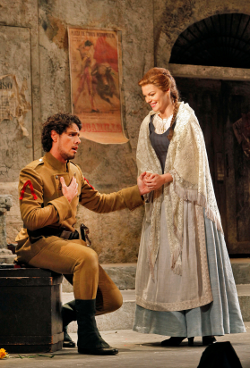
14 Nov 2011
Carmen in San Francisco
Déja vu. Well, sort of. Last time around (2006) there was a Carmen and then another who canceled leaving San Francisco Opera in the lurch.
English Touring Opera are delighted to announce a season of lyric monodramas to tour nationally from October to December. The season features music for solo singer and piano by Argento, Britten, Tippett and Shostakovich with a bold and inventive approach to making opera during social distancing.
This tenth of ten Live from London concerts was in fact a recorded live performance from California. It was no less enjoyable for that, and it was also uplifting to learn that this wasn’t in fact the ‘last’ LfL event that we will be able to enjoy, courtesy of VOCES8 and their fellow vocal ensembles (more below …).
Ever since Wigmore Hall announced their superb series of autumn concerts, all streamed live and available free of charge, I’d been looking forward to this song recital by Ian Bostridge and Imogen Cooper.
Although Stile Antico’s programme article for their Live from London recital introduced their selection from the many treasures of the English Renaissance in the context of the theological debates and upheavals of the Tudor and Elizabethan years, their performance was more evocative of private chamber music than of public liturgy.
Evidently, face masks don’t stifle appreciative “Bravo!”s. And, reducing audience numbers doesn’t lower the volume of such acclamations. For, the audience at Wigmore Hall gave soprano Elizabeth Llewellyn and pianist Simon Lepper a greatly deserved warm reception and hearty response following this lunchtime recital of late-Romantic song.
For this week’s Live from London vocal recital we moved from the home of VOCES8, St Anne and St Agnes in the City of London, to Kings Place, where The Sixteen - who have been associate artists at the venue for some time - presented a programme of music and words bound together by the theme of ‘reflection’.
'Such is your divine Disposation that both you excellently understand, and royally entertaine the Exercise of Musicke.’
‘And there was war in heaven: Michael and his angels fought against the dragon; and the dragon fought and his angels, And prevailed not; neither was their place found any more in heaven … that old serpent … Satan, which deceiveth the whole world: he was cast out into the earth, and his angels were cast out with him.’
There was never any doubt that the fifth of the twelve Met Stars Live in Concert broadcasts was going to be a palpably intense and vivid event, as well as a musically stunning and theatrically enervating experience.
‘Love’ was the theme for this Live from London performance by Apollo5. Given the complexity and diversity of that human emotion, and Apollo5’s reputation for versatility and diverse repertoire, ranging from Renaissance choral music to jazz, from contemporary classical works to popular song, it was no surprise that their programme spanned 500 years and several musical styles.
The Academy of St Martin in the Fields have titled their autumn series of eight concerts - which are taking place at 5pm and 7.30pm on two Saturdays each month at their home venue in Trafalgar Square, and being filmed for streaming the following Thursday - ‘re:connect’.
The London Symphony Orchestra opened their Autumn 2020 season with a homage to Oliver Knussen, who died at the age of 66 in July 2018. The programme traced a national musical lineage through the twentieth century, from Britten to Knussen, on to Mark-Anthony Turnage, and entwining the LSO and Rattle too.
With the Live from London digital vocal festival entering the second half of the series, the festival’s host, VOCES8, returned to their home at St Annes and St Agnes in the City of London to present a sequence of ‘Choral Dances’ - vocal music inspired by dance, embracing diverse genres from the Renaissance madrigal to swing jazz.
Just a few unison string wriggles from the opening of Mozart’s overture to Le nozze di Figaro are enough to make any opera-lover perch on the edge of their seat, in excited anticipation of the drama in music to come, so there could be no other curtain-raiser for this Gala Concert at the Royal Opera House, the latest instalment from ‘their House’ to ‘our houses’.
"Before the ending of the day, creator of all things, we pray that, with your accustomed mercy, you may watch over us."
The doors at The Metropolitan Opera will not open to live audiences until 2021 at the earliest, and the likelihood of normal operatic life resuming in cities around the world looks but a distant dream at present. But, while we may not be invited from our homes into the opera house for some time yet, with its free daily screenings of past productions and its pay-per-view Met Stars Live in Concert series, the Met continues to bring opera into our homes.
Music-making at this year’s Grange Festival Opera may have fallen silent in June and July, but the country house and extensive grounds of The Grange provided an ideal setting for a weekend of twelve specially conceived ‘promenade’ performances encompassing music and dance.
There’s a “slide of harmony” and “all the bones leave your body at that moment and you collapse to the floor, it’s so extraordinary.”
“Music for a while, shall all your cares beguile.”
The hum of bees rising from myriad scented blooms; gentle strains of birdsong; the cheerful chatter of picnickers beside a still lake; decorous thwacks of leather on willow; song and music floating through the warm evening air.

Déja vu. Well, sort of. Last time around (2006) there was a Carmen and then another who canceled leaving San Francisco Opera in the lurch.
Of the several step-ins one seemed the most unlikely. But American lyric mezzo Kate Aldrich surprised everyone with a Carmen that was splendidly charismatic. Five years later la Aldrich, now a Rossini diva as well, was to be the centerpiece for eleven performances of this get-em-in-the-opera-house war horse. Guess what!
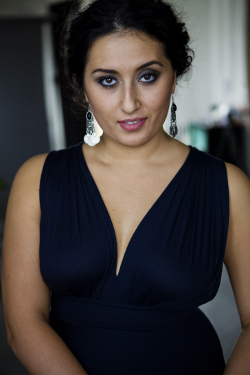 Anita Rachvelishvili [Photo courtesy of San Francisco Opera]
Anita Rachvelishvili [Photo courtesy of San Francisco Opera]
But this time, so far, the replacements have been very likely Carmens. American mezzo and recent Adler Fellow Kendall Gladden took the first two performances. This fine young artist has already distinguished herself as a viable Carmen on several of the world’s major stages. Georgian diva Anita Rachvelishvili, a veteran of the role at La Scala, the Met, Munich, etc., has now made her local debut and takes the next four performances as well. San Francisco Opera still hopes Mme. Aldrich may arrive for the final four performances, but stay tuned.
The problem is that Kate Aldrich is a very specific artist. She has a tonality that incorporates her quite lyric voice with a bright, American presence. It would seem that San Francisco Opera built its cast around this formidable persona and that meant lighter voices and lighter weight personalities. And since Carmen is a dialogue and numbers opera anyway the artistic concept seems to have been to make it a true operetta-like musical.
A light-weight cast was the result. Young Brazilian tenor Thiago Arancam was an adolescent looking and sounding Jose whose singing gave great pleasure but who lacked the power to make Jose’s frustration and rage seem more than a temper tantrum. Current Adler Fellow Sara Gartland possesses a small, quite lovely voice with an engaging flutter. She was a Micaela blown about the stage by the whims of a few soldiers and smugglers rather than the stolid emotional force of Jose’s ties to his mother.
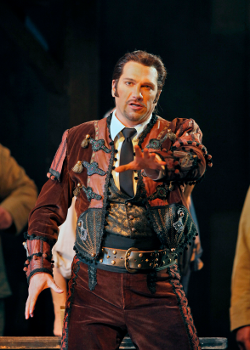 Paulo Szot as Escamillo
Paulo Szot as Escamillo
Brazilian baritone Paulo Szot was the Escamillo. His claim to fame is the role of Emile De Becque in a Broadway revival of South Pacific and as the caricatural Shostakovich Nose at the Met. Mr. Szot simply lacks the operatic coglioni to fight bulls and seduce Carmen, but he did make a more or less pretty figure on the stage.
All this light artillary confronted a Carmen of maximum operatic magnitude, Anita Rachvelishvili. Mlle. Rachvelishvili has a big, big voice that she manages with grace and subtlety, and she does project a forceful personality if not a particularly sexual one. She apparently arrived in enough time to get her mind around the production’s dialogues but hardly in time to be integrated into its staging, if there ever was any. As it was she made generic Carmen moves from time to time.
This 1981 Jean Pierre Ponnelle production once had an edge. It was in fact the first time Bizet’s spoken dialogues were incorporated at the War Memorial and among the first times on any major stage in the world. To effect such daring Ponnelle obviously needed to downsize the public’s idea of Carmen from grand opera to a music hall ambiance.
This need accounts for the small false proscenium embedded in a massive, full stage stone wall. The little proscenium opens and closes upon some historical scenic ideas (as well as a few more sophisticated techniques) that Ponnelle uses to substitute for the grand opera ideas of locale and ambiance.
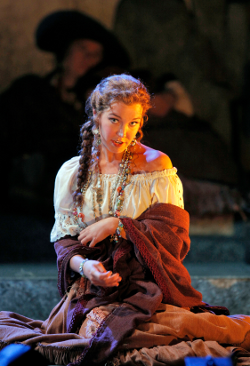
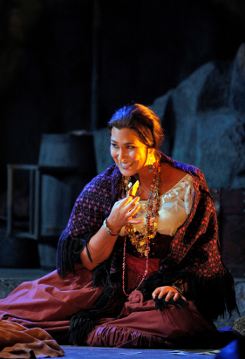 Susannah Biller as Frasquita (above) and Cybele Gouverneur as Mercedes (below)
Susannah Biller as Frasquita (above) and Cybele Gouverneur as Mercedes (below)
But more than anything else the stone wall foreshortened stage depth determining that the staging be presentational, like music theater once was (and maybe still is). Can this explain why Jose seemed to be singing the "Flower Song" to the audience? And why Jose and Escamillo confronted one another without confronting one another (they seemed to be confronting the conductor). While the program does credit a fight choreographer these several crucial events that we look forward to in Carmen were inordinately weak.
Meanwhile, o Dio, we had Nicola Luisotti in the pit, a more formidable opera conductor cannot be imagined. Once again blatant staging concessions were obviously made to this tyrannical maestro so that all his musical points could be maximally vivid. And vivid Bizet’s music was. Maybe it was the point and flash of the music that made the stage seem so painfully pallid and therefore undermined our enjoyment of the performance.
Of the comprimarios the Dancairo of Timothy Mix had real flash, and the Moralès of Trevor Scheunemann well filled the stage. Adler Fellow Susannah Biller as Frasquita lacked the brilliance and volume of the high notes needed to vocally anchor the big ensembles. Wayne Tigges as Zuniga failed to find the fascistic stance that the Ponnelle production introduced to establish a political tyranny equal to the emotional tyranny imposed by Jose's mother.
The fashion to use the very compromised (i.e. hugely shortened) opéra comique dialogues in big opera houses has long since disappeared, and it is time to retire the Ponnelle production rather than destroy its integrity by producing it in unfavorable circumstances. The French dialogues just now were a pleasure however, easily understandable to anyone with high school French. Cleverly one Frenchman was introduced into the cast, Micaela’s mountain guide boy, so that we could hear what real French sounds like.
Michael Milenski
Click here for additional information regarding this production.